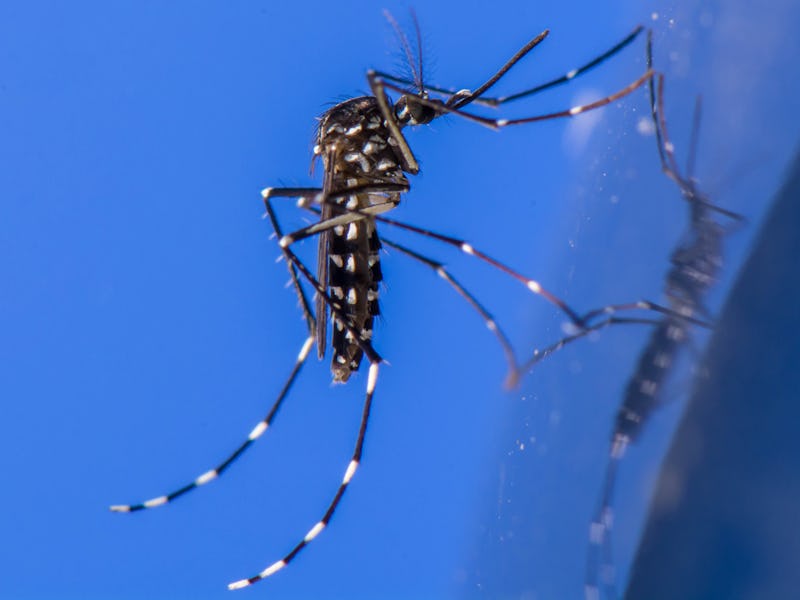Mosquitos Are best repelled by DEET
But fending off skeeters may also be part of Victoria’s Secret.

A recent study concluded that while DEET is the best way to repel mosquitos, an Eau de Parfum from Victoria’s Secret was also an effective option.
Published in the October edition of Journal of Insect Science, the work was done by researchers from New Mexico State University’s College of Arts and Sciences, who were looking to proof the efficacy of mosquito repellents.
The research team took 10 commercially available products and put them to the test against the yellow fever mosquito (Aedes aegypti) and the tiger mosquito (Aedes albopictus), both known to transmit diseases.
“People need to protect themselves, especially if they travel to the tropics,” said Immo Hansen, an NMSU associate professor of biology when discussing the study with the New Mexico State University’s website, “Insect repellents can be highly efficient, but you need to find out which work.”
The testing included three sprays that use diethyltoluamide: Repel 100 Insect Repellent, OFF Deep Woods Insect Repellent VIII and Cutter Skinsations Insect Repellent — as well as four DEET-free options: Cutter Natural Insect Repellent, EcoSmart Organic Insect Repellent, Cutter Lemon Eucalyptus Insect Repellent, and Avon Skin So Soft Bug Guard. According to the study, while “DEET is considered a very safe repellent… fear of possible side effects of DEET and general chemophobia has resulted in the development of a multitude of “DEET-free” mosquito repellents.”
To test the products, a volunteer placed a hand at one angled end of a Y-shaped tube — at the far end of the same tube was a chamber holding 20 mosquitos — with the other Y branch a free space.
Once the helper’s scent was fanned toward the chamber (as mosquitos are attracted to lactic acid and octanol, components of human sweat), the target hand was anointed with each of the repellents in question. Once the test began, the mosquitos were watched to see if there was immediate and eventual biting over a four-hour period, with observation points at zero minutes, 30 minutes, 120, and 240 minutes.
A repellent-free hand was used at first — which drew 61 percent of the 20 yellow fever mosquitos, 41 percent of the tigers.
Of the applications that followed, the DEET-containing sprays OFF Deep Woods Insect Repellent VIII, Repel 100 Insect Repellent, and Cutter Skinsations Insect Repellent were the most successful. All three kept both the yellow fever and tiger mosquito biting under 20 percent as late as 120 minutes into their tests, and Repel 100 took the prize by scoring a bite percentage of 14 at the 240-minute mark.
On the other hand, the four DEET-free options tested (Cutter Natural Insect Repellent, Cutter Lemon Eucalyptus Insect Repellent, Avon Skin So Soft Bug Guard, EcoSmart Organic Insect Repellent) were all subject to an over-50 percent yellow fever mosquito biting by the 120 minute post—save the Cutter Lemon Eucalyptus, at only 13 percent. Additionally, all four non-DEET options were subject to tiger mosquitos biting under 25 percent at two hours — except for Cutter Natural, which was recorded to have a 120-minute mark biting percentage of 37.
As for the final three test subjects, an AgraCo Technologies vitamin B1-based Mosquito Skin Patch, Avon brand Skin So Soft Bath Oil, and Victoria’s Secret Bombshell perfume — it was the patch that was recorded as least effective, with 48 percent of the yellow fever and 34 percent of the tiger mosquitos recorded biting at 120 minutes. Skin So Soft saw 43 yellow fever/ 36 tiger at that same mark — but as for the “Bombshell” perfume, only 18 percent of the yellows and 17 percent of the tigers were biting at that point, making it (in this study) statistically effective.
The Victoria’s Secret website describes the fragrance as “Sexy today, sexy tomorrow, sexy forever.”
To a mosquito? Maybe not so much.